ISLAMABAD: The government has allocated Rs40 billion for the poorest districts of Pakistan to improve the living standards of the poverty-stricken people with a view to ending the rising provincial and regional disparities among the masses.
This is in line with the government’s goal of devising such economic development plans that benefit the most neglected strata of society to bring them out of the vicious cycle of poverty that has been exacerbated by the runaway inflation, reports WealthPK.
In an exclusive interview with WealthPK, Secretary Planning, Development and Special Initiatives Syed Zafar Ali Shah said that the Ministry of Planning had set aside Rs40 billion under the Public Service Development Programme (PSDP) for uplift of the highly impoverished districts by developing health and education sectors and infrastructure.
While sharing further details, he said the ministry had devised a preliminary plan to pick six districts from Balochistan, three from Khyber Pakhtunkhwa, five from Sindh and six from Punjab for the programme. “However, a comprehensive survey will be conducted by the United Nations Development Programme to formulate the criteria for inclusion of districts in this cluster.”
“The provincial governments will also have their share in the overall allocation and the responsibility so that the purpose of programme could be served,” Zafar Ali Shah said, adding that priority areas would be infrastructure, agriculture, health, and financial poverty.
Commenting on the step, development economist Dr. Amanat Ali said that the allocation would help overcome the multidimensional poverty in these districts. He also emphasised the need for vigilance and transparency to get the desired results of the initiative.
Pakistan has been plagued with rising levels of poverty over the years with the people suffering from undernutrition, fragile health, little or no literacy, poor access to basic needs, vulnerable circumstances, and a lack of decent jobs and living. They often live in environmentally impoverished areas and tend to have a very limited political voice.
According to the World Bank Report 2021, Pakistan has 39.3% poverty rate with two million people living below the poverty line. Pakistan has a long history of formulating and implementing poverty reduction programmes, but the rising poverty levels reflect poorly on the strategies adopted to fight this deep-rooted problem. Moreover, poverty-reduction has mostly concentrated on immediate results rather than addressing the multidimensional vulnerabilities that perpetuate poverty.
For poverty reduction on a sustainable basis, the government must formulate a long-term, comprehensive programme to address different dimensions of poverty through increased pro-poor expenditure rather than focusing on income-support interventions only.
Learning from the successful Chinese experience of dealing with poverty and replicating it in Pakistan is important to get the desired results.






